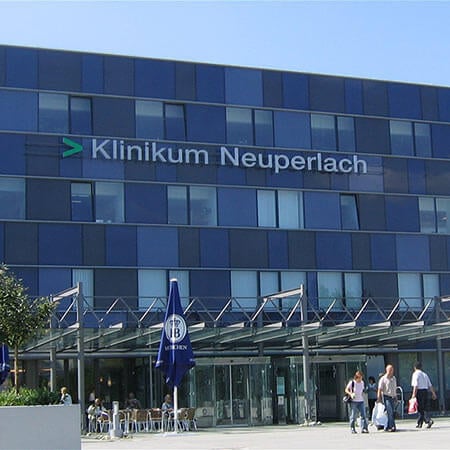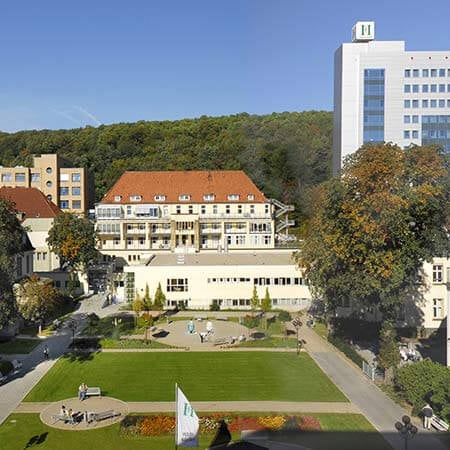Diabetes insipidus (DI)
Due to the difficulties associated with the organization of treatment in Turkey, Switzerland, South Korea and India, we are not currently processing requests to these regions.
If you are interested in treatment in Germany, please leave a request and our specialists will contact you as soon as possible.
Diabetes insipidus is an endocrine disorder, which is characterized by a sharp increase in fluid intake and daily diuresis (urine volume). DI is rarely met and makes up less than 1% of all pathologies of endocrine glands. Without proper treatment the illness leads to lethal outcome, as a consequence of dehydration and electrolyte disorders. However, hormone replacement therapy can restore normal water-mineral metabolism.
The Booking Health portal presents 49 German clinics specializing in diabetes insipidus (DI) treatment
Show all clinics
Diabetes insipidus (DI) – Diagnostics
Criteria for the diagnostics of diabetes insipidus:
- Polyuria, which is diuresis of 3 liters and more per day
- Normal blood glucose level (excludes diabetes mellitus)
- Low density of urine (below 1005)
- Low osmolality of urine (below 300 mOsm/kg)
In addition to diabetes mellitus it is necessary to exclude:
- Kidneys pathology
- An elevated level of calcium in the blood
- Low level of potassium in the blood
Dry diet test helps to confirm the diagnosis, when a person is prohibited to drink water during 12 hours. DI is verified if body weight decreases by 5% and more, and urine osmolarity is still lower than 300 mOsm/kg.
Also MRI is done to evaluate the level of pituitary gland structural changes. This diagnostic technique helps to visualize the space-occupying lesions in the central nervous system.
Best clinics for the diabetes insipidus (DI) diagnostics in Germany:
Diabetes insipidus – Treatment
Diabetes insipidus develops as a result of hormone vasopressin deficiency. As follows, it is necessary to restore the level of this hormone. A synthetic analogue of the antidiuretic hormone, called desmopressin, is used for treatment. It is prescribed in the form of pills or nasal spray. Replacement therapy is prescribed for the rest of the life. Doses are determined based on the severity of vasopressin deficiency.
It is very hard to treat diabetes insipidus of the renal origin. Right now, there is only symptomatic and pathogenetic treatment aimed at preserving fluid in the body and reducing electrolyte disturbances.
The following drugs are used:
- Thiazide diuretics (hydrochlorothiazide)
- Non-steroidal anti-inflammatory drugs (indomethacin)
- Potassium-sparing diuretics (amiloride)
Thiazide and loop diuretics are used in patients with renal diabetes insipidus, caused by lithium drugs. Recent trials has shown that potassium-sparing diuretics are also effective for this pathological condition cure, therefore, amiloride is also prescribed in German hospitals and other developed countries.
Best clinics for the diabetes insipidus (DI) treatment in Germany:

Hospital Neuperlach Munich

University Hospital of Ludwig Maximilian University of Munich

HELIOS University Hospital Wuppertal
Author:
The article was edited by medical expert, board certified Dr. Nadezhda Ivanisova. For the treatment of the conditions referred to in the article you must consult a doctor; the information in the article is not intended for self-medication!
Sources:
The cost of services includes
Here you can find the cost of treatment for this disease at the German University Hospitals. Leave a request and we will provide a free consultation with a doctor and will start organizing the whole treatment process.
The program includes the following:
- Issuing of an invitation for getting a visa for treatment as quick as possible
- Fixing an appointment at a time convenient for you
- Preliminary organization of a comprehensive examination and discussion of the forthcoming treatment plan
- Arranging transfer from the airport to the hospital and back to the airport
- Provision of interpreting services and services of a personal medical coordinator
- If necessary, assistance in the organization of further surgical treatment
- Provision of a medical insurance against treatment complications covering up to 200,000 euro
- Preparation and translation of medical records and recommendations from the hospital
- Assistance in the subsequent communication with your attending physician, including consultations on repeated X-ray images through the unique medical document management system E-doc

